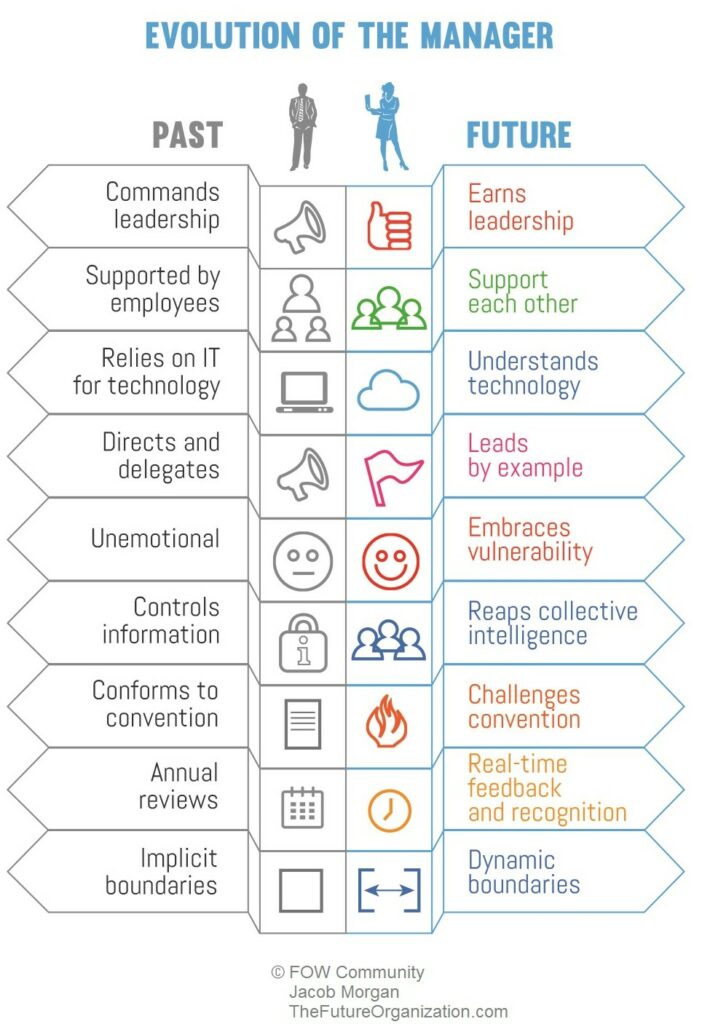This concept and the visual was taken from my new book, The Future of Work: Attract New Talent, Build Better Leaders, and Create a Competitive Organization.
A few months ago I introduced the concept of the 7 Principles of the Future Employee which was followed by The Evolution of the Employee. I’m taking this same approach (principles and evolution) and applying it to managers as well. Last week I shared the 10 Principles of the Future Manager so it’s only fitting that we now get to the evolution of the manager as seen below.
Based on the above these are the key things to pay attention to.
Managers must be leaders
There’s a constant debate around whether we need more managers or more leaders. Sadly this is a fruitless debate that artificially pits the two against each other. When thinking about the future of work managers MUST be leaders. That is, they are placed in a position of power because they have earned followers, thought leadership, and respect. If a manager is simply placed in a position of power because they are able to bring in the most money or are experts at delegating then they will fail. It’s time we stop referring to managers and leaders as two separate people. If you haven’t earned leadership then you shouldn’t be a manager.
Managers must understand the trends shaping the future of work
These five trends were explored in a previous article called, The Five Trends Shaping the Future of Work but to recap them here they are: mobility, globalization, new behaviors, millennials (demographics), and technology. Managers must successfully understand what these five trends are and how they are going to impact their respective organizations. These trends are the basic building blocks (the DNA) of the future of work.
Managers must embrace vulnerability
We can no longer have managers in the workplace that resemble robots. It’s bad enough that there is quite a bit of concern around actual robots taking jobs away from humans, the last thing we need are humans that act like robots. It makes me think of the saying, “I’m not a doctor but I play one on t.v.” – applied to managers this would be “I’m not a robot but I play one in the workplace.” Brene Brown said it best when she quipped that there is no innovation without vulnerability. This is because people want to build relationships with other…people. This requires trust and a human connection. When managers put up a wall of being stoic, all-knowing, emotionless beings, they kill off any hope of innovation, trust, and connection. Managers embracing vulnerability in the workplace isn’t important because it’s a nice thing to do but because it’s crucial for effective communication, collaboration, and innovation.
Managers must challenge convention
Why is it that we constantly hear about managers that are “putting out fires?” Managers must be the fire-starters! That is, they must be constantly thinking of ways that they can challenge the assumptions that we have around how work gets done. Should managers make all the decisions? Do we need annual employee reviews? Can anyone in the company be a leader? Should innovation be a core skill taught to all employees? Can the organization set up a pool of experimental capital that can be used to test out new ideas? These are the types of questions and ideas that managers should be thinking about. Today, their stereotypical role focuses on constraint, control, order, diligence, and sticking with the common assumptions that have long guided how we work. Instead, managers must heed the word of the band Prodigy to become “fire-starters.”
Managers of the future are very different than managers of the past, they must evolve.


I guess a simple “Thank you” would not be enough for your great work in making the dramatic changes “visible” which are needed to go to the next level – I am promoting your work wherever I can – because it makes perfect sense for me!